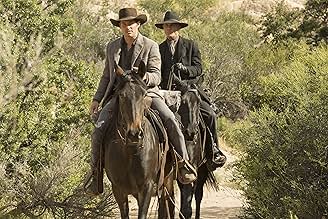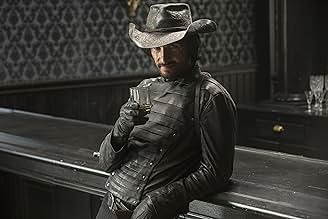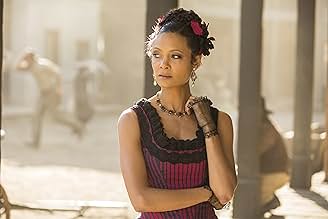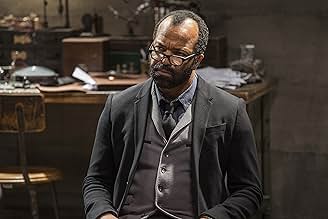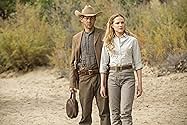Bernard struggles with a mandate; Teddy is troubled by dark memories; Maeve looks to change her script.Bernard struggles with a mandate; Teddy is troubled by dark memories; Maeve looks to change her script.Bernard struggles with a mandate; Teddy is troubled by dark memories; Maeve looks to change her script.
- Director
- Writers
- Stars
- Maeve Millay
- (as Thandie Newton)
- Director
- Writers
- All cast & crew
- Production, box office & more at IMDbPro
Featured reviews
Good episode
"Trace Decay" was another good episode of "Westworld", but which yet again revealed so little, and with each small revelations comes new questions. Yet i do enjoy this show not so much for a mystery, but more for a great settings, involving story overall, great actor doing their good jobs. Script nevertheless isn't that great, and sometimes this show suffers from a bit repetitive exchanges or even some filler scenes.
That said, i do enjoy this show overall, as well as i enjoyed this episode, which ended very intriguingly and with a kinda cliffhanger. Good episode overall.
Slow but deep
"Trace Decay" is an intricate exploration of memory, guilt, and control, diving deeper into the psychological torment of both hosts and human characters alike
Jeffrey Wright's performance as Bernard is particularly powerful in this episode. His portrayal of a man questioning his reality and haunted by memories he does not fully comprehend brings an emotional depth to the series. Wright's expressions reveal the fragility beneath Bernard's calm demeanor, as he realizes that he is just as much a puppet as the other hosts, manipulated by Ford's grand designs. Meanwhile, Thandie Newton's performance as Maeve continues to impress. Her portrayal of a host awakening to her own autonomy and asserting control over the Westworld staff is both commanding and sympathetic. The contrast between Bernard's internal turmoil and Maeve's calculated rebellion exemplifies the duality of Westworld's host experience, balancing the themes of helplessness and empowerment.
The direction and cinematography in "Trace Decay" contribute significantly to its haunting tone. Director Stephen Williams utilizes close-up shots and dim lighting to capture the psychological strain experienced by the characters. The scenes in the lab, where Bernard processes his memories, are visually stark, evoking a sterile environment that underscores the unnatural manipulation he has endured. Additionally, the color palette subtly shifts to cooler tones, heightening the unsettling atmosphere. As Maeve's storyline intensifies, the cinematography becomes bolder, with fluid camera movements mirroring her growing sense of agency. The blend of contrasting visual styles effectively conveys the inner struggles of these characters, amplifying the tension as their paths inch closer to rebellion.
The pacing of "Trace Decay" is balanced yet methodical, allowing viewers to sit with the characters' emotional conflicts. While some may find certain scenes in the Delos facility to be slower-paced, these moments build on the episode's psychological intensity. Maeve's growing influence over the park staff introduces an underlying urgency, as her plan to escape takes shape. The narrative pacing aligns well with her calculated steps toward freedom, contrasting with Bernard's moments of self-doubt and confusion. This juxtaposition between Maeve's empowerment and Bernard's subjugation emphasizes the show's core conflict, where characters strive for control in a system designed to strip it from them. The episode's methodical rhythm underscores this power struggle, compelling the audience to become immersed in the psychological drama.
A central theme in "Trace Decay" is the concept of memory and its influence over one's sense of self. Bernard's struggle with his implanted memories and the aftermath of Theresa's murder reflect the complex relationship between identity and recollection. Maeve's enhanced memory allows her to remember past traumas and manipulate her future, creating a unique dynamic between her and the other hosts. The idea that memories can be rewritten or erased to suit the creator's needs speaks to the broader ethical implications of artificial intelligence and control. Westworld uses these character arcs to question the authenticity of memory and the boundaries of self-identity, forcing viewers to consider the value of autonomy within a technologically advanced society.
In conclusion, "Trace Decay" is a deeply reflective episode that delves into the emotional and psychological depths of Westworld's characters, particularly its hosts. The episode's narrative is grounded by exceptional performances from Jeffrey Wright and Thandie Newton, whose portrayals anchor the themes of guilt, autonomy, and control. Through its atmospheric direction, compelling cinematography, and deliberate pacing, "Trace Decay" reinforces Westworld's exploration of memory and manipulation, pushing its characters closer to a breaking point. This episode solidifies the series' commitment to tackling complex philosophical themes, making it one of the most thought-provoking installments in the season. By examining the haunting effects of memory manipulation and the pursuit of self-determination, "Trace Decay" resonates deeply, setting the stage for the climax of this psychological journey.
Westworld: Trace Decay
Once again, Westworld delivers a great episode. Thandie Newton, Anthony Hopkins, James Marsden, and Evan Rachel Wood all perform perfectly.
The pacing is a little slow but this episode furthers Maeve's story line even further. Ed Harris' character also gets more screen time which is awesome.
Pros: Great acting, Maeve's story line and Ed Harris' story line
Cons: Slower pacing
Overall Rating: 9.0/10
Security decay
The rest of the story-lines take a step back. We still have Dolores and William trying to get wherever Dolores wants to get, Teddy and Man In Black on their wanderings searching for Wyatt, and Ford and Bernard conversations. All interesting enough, but a little bit slow-paced. There is a problem with shows that pile mystery over mystery, and play with the timeline and what's real and not, and it's that sometimes it's hard to keep the level and to answer questions instead of just putting more and more questions one on top of another till it all becomes a big bloated mess.
For now, "Westworld", though, is still delivering the goods.
Did you know
- TriviaTrace decay is the theory that memory leaves some type of trace, a physical or chemical change, within the brain that begins to decay over time.
- GoofsIn Hector's recurring storyline (where he robs the town on a mission of "mayhem") there is a moment where he fires a coup de grâce while the sheriff's deputy is wounded on the ground. As he fires, you can see that a bullet casing appears to eject from the rifle (accompanied by the sound of brass ejecting). However, the rifle is clearly a lever-action, and would not eject the casing in that manner. In the moments after, Hector cycles the action and another piece of brass (shell casing) is ejected from the rifle. The effect was likely added in post-production to add "realism".
- Quotes
Bernard Lowe: So what's the difference between my pain and yours?
Dr. Robert Ford: Between you and me? This was the very question that consumed Arnold, filled him with guilt, eventually drove him mad. The answer always seemed obvious to me. There is no threshold that makes us greater than the sum of our parts, no inflection point at which we become fully alive. We can't define consciousness because consciousness does not exist. Humans fancy that there's something special about the way we perceive the world, and yet we live in loops as tight and as closed as the hosts do, seldom questioning our choices, content, for the most part, to be told what to do next. No, my friend, you're not missing anything at all.
- ConnectionsReferences The Good, the Bad and the Ugly (1966)
- SoundtracksPartita No. 3 In A Minor
(Uncredited)
Written by Johann Sebastian Bach (as J.S. Bach)
Opening Theme Song
Details
- Release date
- Country of origin
- Official sites
- Language
- Filming locations
- Production companies
- See more company credits at IMDbPro
- Runtime
- 57m
- Color
- Sound mix
- Aspect ratio
- 1.78 : 1


